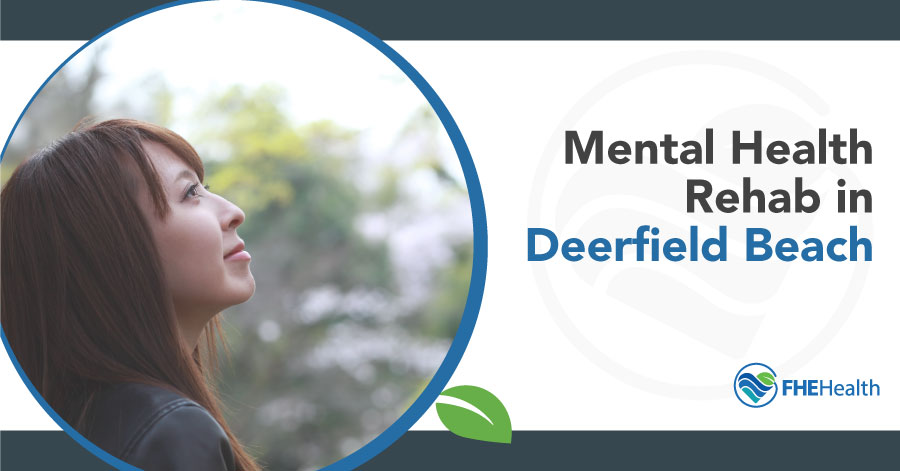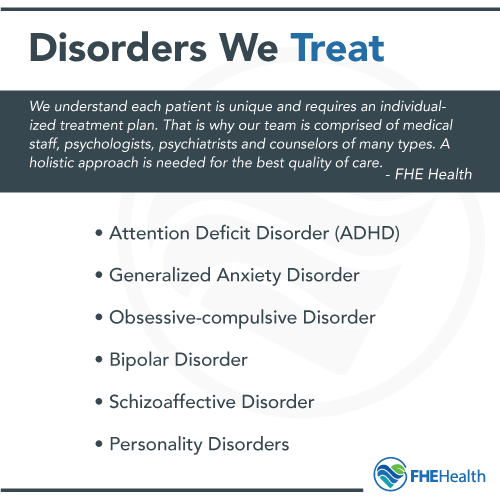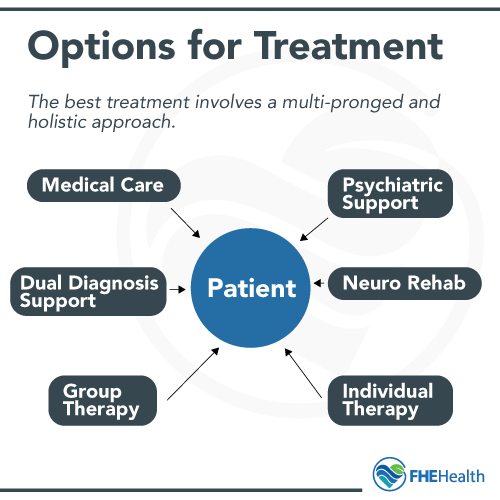
Florida is currently suffering a mental health crisis. Nearly 700,000 adults and children in Florida are struggling to cope with depression, bipolar disorder, PTSD, schizophrenia and other mental illnesses that often leave them unable to adequately care for themselves. Many can’t access treatment simply because resources are not available or they can’t navigate the complicated, poorly run mental health care system.
According to the Florida Health Behavioral Association, there are more suicides than homicides in over 60 Florida counties. Florida is also one of 10 states that have high incarceration rates and the lowest access to treatment resources for mental health issues. While Florida is trying to rectify the state’s profound mental health crisis, FHE Health is actively expanding the outreach of our mental health rehab in Deerfield Beach to serve residents in Broward and Palm Beach counties who suffer from mental illness or have loved ones with mental health problems.
Ready to start? More questions about treatment? Mental illness can affect anyone at any point in their lives. The onset of most mental illnesses begins as early as age 14, with three out of four people developing their particular mental illness by their early 20s. Unfortunately, the changes in behavior, mood, and personality often seen in teenagers may mask signs and diagnosis of mental illness. Parents may attribute moodiness, isolation, and depression as growing pains and assume their teen will grow out of it. Attention deficit hyperactivity disorder: Both children and adults can have ADHD. Treatment includes counseling, determining proper medication plan, if required, and teaching patients how to cope with anxiety. Generalized anxiety disorders: No one is immune to episodes of anxiety, but when fear, panic, and anxiety overwhelm a person to the point that they can’t function normally, they should seek treatment as it will improve quality of life. Obsessive-compulsive disorder: Like anxiety, OCD can negatively imp act a person’s life, making it impossible for them to leave their home, work or enjoy relationships with others. People with OCD are compelled to perform ritualistic actions due to obsessive thoughts about something bad happening if they don’t complete that behavior. Bipolar disorder: Extreme and occasionally rapid cycling of high and low moods are indicative of bipolar disorder. During manic episodes, people with bipolar disorder talk almost nonstop, engage in impulsive and sometimes dangerous activities, refuse to listen to anybody and may have delusions about their invincibility. During depressed episodes, they feel sad, hopeless, sleep all day and might express suicidal ideation. Schizoaffective disorders/schizophrenia: These mental illnesses are the most severe and require immediate treatment at a mental health rehab, such as our Deerfield Beach rehabilitation center. People with schizophrenia hear voices, have visual hallucinations, behave oddly and can’t take care of themselves properly. Personality disorders: Characterized by maladaptive behavior — emotional and cognitive patterns that deviate from norms expected from society — personality disorders generally develop during childhood and persist into adulthood. People diagnosed with a schizotypal personality disorder often have peculiar ideas, present odd emotional responses in certain situations, may dress differently and engage in magical thinking or the belief that events or people can influence their lives. A difference between mental illnesses and personality disorders is that people with moderate to severe mental illness often need help completing normal daily tasks. However, individuals with avoidant, antisocial, borderline or narcissistic personality disorders are often self-sufficient but experience tumultuous lives due to acting impulsively and irrationally. Medication is essential For schizophrenia, psychiatrists usually prescribe antipsychotic medications to control hallucinations, impulsivity and disorganized/delusional thinking. Instead of regulating serotonin, medications for schizophrenia regulate dopamine, another important neurotransmitter involved in learning, attention, movement and emotions. Medications that block dopamine receptors in the brain minimize symptoms of schizophrenia, especially hallucinations and disorganized thinking. Psychotherapy is an umbrella term for different forms of talk therapy provided by psychologists and counselors at our mental health rehab in Deerfield Beach. Psychotherapeutic techniques such as cognitive behavioral therapy and dialectical behavioral therapy help patients work through their problems to identify stressors that may be contributing to their mental illness. People with depression, anxiety, bipolar disorder, ADHD and OCD usually benefit dramatically from CBT, a popular psychotherapy that examines the connection between a person’s thoughts and their emotions. CBT navigates patients through thought-restructuring strategies that eliminate abnormal, negative thought patterns. A problem-focused, goal-directed psychotherapy, CBT teaches patients that thoughts, not external forces, reinforce self-defeating thoughts. For people with schizoaffective disorders, CBT may be introduced after patients have responded to medications and no longer suffer hallucinations or delusions. FHE Health is located on a large campus in South Florida where we help patients get the treatment they need in an inpatient, outpatient or residential setting. Please call us today if you have a loved one who is suffering a mental health condition that is interfering with their ability to live a stable, happy life. We have been meeting the health care needs of South Florida residents for over 20 years and look forward to helping all Floridians with mental health problems. Mental health treatment in Deerfield Beach can be the start of a better life. Whether you’re a local resident or traveling from a distance, you can contact us 24 hours a day at (833) 596-3502 for help getting you on the path to mental health. With an insistence on only the highest standards in policy compliance and documentation, and a strong commitment to highly ethical business practices... read moreBegin your recovery today
Mental Health Problems Requiring Treatment
 Mental illness includes many disorders classified as medical conditions that negatively affect a person’s thought processes and ability to regulate emotions and objectively perceive reality. Depending on the type and severity of mental illness, a person may be unable to maintain healthy relationships, remain employed or function well enough to adequately take care of themselves.
Mental illness includes many disorders classified as medical conditions that negatively affect a person’s thought processes and ability to regulate emotions and objectively perceive reality. Depending on the type and severity of mental illness, a person may be unable to maintain healthy relationships, remain employed or function well enough to adequately take care of themselves.Our Deerfield Beach mental treatment center provides evidence-based, compassionate treatment for the following mental health conditions:
Mental Health Treatment at Our Deerfield Beach Rehab in Florida
Medication
 for restoring chemical imbalances in the brain that contribute to mental illnesses. Antidepressants help people with depression, bipolar disorder, anxiety, ADHD and OCD feel better and more in control of their thoughts by increasing serotonin levels in the brain. Serotonin is a neurotransmitter that regulates emotion, mood, sleep and appetite. In people with mental illnesses (except schizophrenia and other psychoses), serotonin levels are too low and need antidepressants to promote the release of serotonin by certain brain receptors.
for restoring chemical imbalances in the brain that contribute to mental illnesses. Antidepressants help people with depression, bipolar disorder, anxiety, ADHD and OCD feel better and more in control of their thoughts by increasing serotonin levels in the brain. Serotonin is a neurotransmitter that regulates emotion, mood, sleep and appetite. In people with mental illnesses (except schizophrenia and other psychoses), serotonin levels are too low and need antidepressants to promote the release of serotonin by certain brain receptors.Psychotherapy
Cognitive Behavioral Therapy
South Florida Mental Health Care
Contact Us
About Brett Friedman






